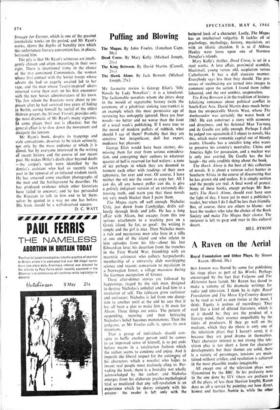A Raven on. the Aerial
BEN JONSON was fleered by some for publishing his stage plays as part of his Works. Perhaps encouraged by the fact that Volpone and The Alchemist have lasted, Mr Raven has dared to make a volume of his dramatic writings for radio and television. I think he is right. Royal Foundation and The Move Up-Country deserve to be read as well as seen (twice at the most, I think; Equity is jealous of recordings). They read like a kind of diluted literature, which is as it should be; they are the product of a literary mind, their essence unquellable by the tricks of producers. If they go well on the medium, which they do (there is only one of the television 'plays that I haven't seen), it is because they are good drama in themselves. Their character interest is not strong (the tele- vision play is too short a form for character development), but their themes are solid, there is a variety of personages, tensions are main- tained without artifice, and resolution is achieved in the most plausible modes imaginable. .
All except one of the television plays were 'riansmitted by the BBC. In' his prefatory note to the 'one done by ITV (there are prefaces to all the plays;of less than ShaVian length), Raven does us all a' service by pointing out how direct, he•nest and fearless Auntie is, 'while the other
shop dithers, delays, cuts out 'bloody' and oven makes nonsense of the whole play by chopping off the denouement Met the viewers work out the end for themselves' is the disingenuous bow made to the instant commercials). Among serious writers, Raven has come out of the TV mangle fatter than any; most of us have long given up trying to give the damned medium what it thinks it wants.
The subjects of the plays may, I think, be called Ravenian. He delights in the wrestlings on points of principle and questions of loyalty that take place in closed communities, particu- larly military and academic. The best of the plays, the title one, is about a conflict between army authority and college authority—what happens when a national-service subaltern, re- cently elected a fellow, orders his commanding officer off the college lawn. The court-martial that follows is riveting television material, since its expected outcome is not just a cashiering but a full-dress drumming out of the regiment. In Sir Jocelyn, The Minister Would Like a Word, a new college has to decide whether to have a lecture-hall or a chapel, and the committee pro- cesses, the lobbyings and intrigues are a kind of streamlined Snow, the voice of incorruption speaking out at the end in a totally unexpected dramatic stroke, remarkably thrilling. Raven, a very sophisticated novelist, is fundamentally moved by the big simple issue of loyalty, and in these short plays he is able to let it ring without qualification and without embarrassment.
I find myself very moved by a play that tries to make no dramatic point at all and is, in fact, presented as pure documentary—The Move Up-Country, which is about a battalion's ad- ministrative problems on the eve of a shift of location in Africa. Raven is fascinated by the army's little world, but he has the skill and insight to make universal observations about the duty of men to each other and to the society which they serve. The Ravenian Toryism has been called romantic, which presumably means that it is unsmartened by cynicism. Cynical readers of this collection, hearing the officer voice, the mower on the college lawn, the clop of the cricket bat (Panther Larkin is a good cricket play), may sneer and say: 'Raven—to me he means England.' Weil, what the hell's wrong with that?
ANTHONY BURGESS



































 Previous page
Previous page